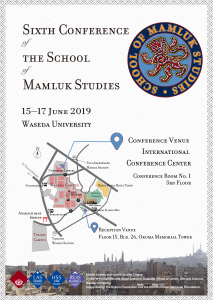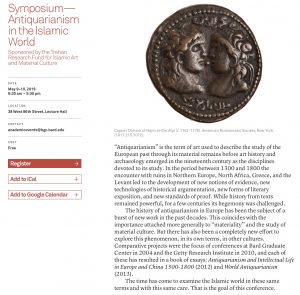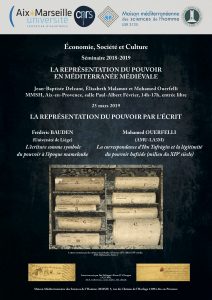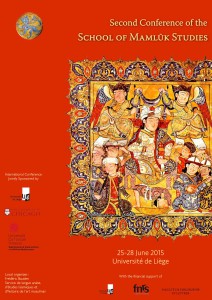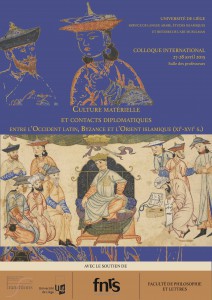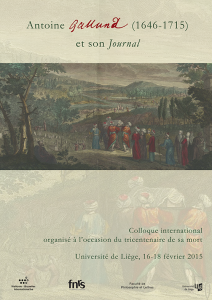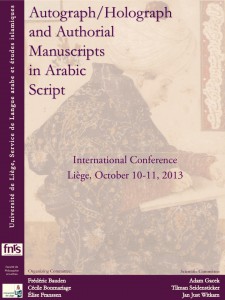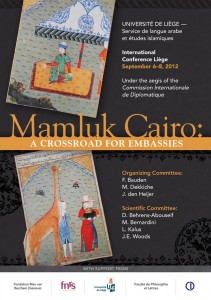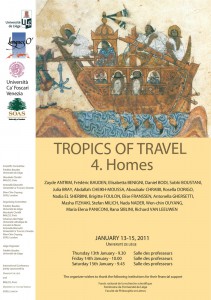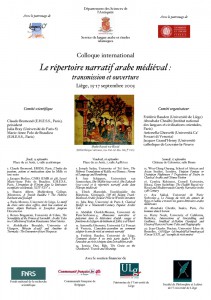Colloques
-
sam15Juin2019lun17Juin2019Waseda University, Tokyo
Sixth Conference of the School of Mamlūk Studies
Prof. Frédéric Bauden will read a paper entitled "Brokering power in Mecca: Rasulid-Mamluk diplomatic exchanges about the Meccan Sharifate". The paper is part of a panel entitled "The Versatile Approach to the Diplomatic Dialogue" and organized by Dr. Alessandro Rizzo (post- doc, CSIC, Barcelona, Liège University).
-
mar21Mai201918h15-19h30Ludwig-Maximilians-Universitäts München, Universitätshauptgebäude Geschwister-Scholl-Platz 1, Hörsaal M 014
Brokering power in Mecca: Rasulid-Mamluk diplomatic exchanges about the Meccan Sharifate
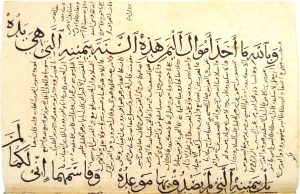 Lecture by Prof. Frédéric Bauden.
Lecture by Prof. Frédéric Bauden.If the control of Mecca (and of the Hijaz in general) represented for the Mamluks a source of legitimation (notably by guaranteeing the yearly organization of the pilgrimage), it appears that their grip on the Holy City was characterized as seasonal. Once the pilgrimage ended, the Sharifs enjoyed political autonomy. In the early ninth/fifteenth c., the Sharif Ḥasan b. ʿAjlān (r. 797–826/1395–1423) was an emblematic example of the power that his family availed itself of. Ḥasan particularly took advantage of the increase in trade between the Indian Ocean and the Mediterranean Sea that passed through the Hijaz to extend his power over the whole region. His exactions from pilgrims and merchants deeply annoyed both the Mamluk and the Rasulid sultans who tried to affect the situation by manipulating the local politics in Mecca.
Over the last decade, John Meloy and Eric Vallet have addressed numerous issues linked to Ḥasan’s reign, respectively from the point of view of the Mamluks and the Rasulids. Their studies were largely based on literary sources, with a limited use of documents. In this paper, I propose to tackle the events that took place between the years 816–20/1413–7, a period during which Ḥasan was briefly replaced by his nephew Rumaytha (818/1416), through the lens of documents. Apart from copies of letters preserved in Ibn Ḥijja’s Qahwat al-inshāʾ, I will also consider a unique Rasulid original letter dated 817/1415 reused as scrap paper by al-Maqrīzī. These documents offer a different insight into the way both sultans tried to face the threat posed by Ḥasan by means of diplomacy. -
jeu09Mai2019ven10Mai2019
-
lun25Mar201914h00-17h00Aix-en-Provence, MMSH, salle Paul-Albert Février
L’écriture comme symbole du pouvoir à l’époque mamelouke
-
lun17Déc201819h00Dar al-Athar al-Islamiyyah, The Al-Sabah Collection, Al-Kuwait, Koweit
Of Buying Many Books There Is No End: Paratextual Marks as a Source for the History of the Book in Islam. Lecture by Frédéric Bauden
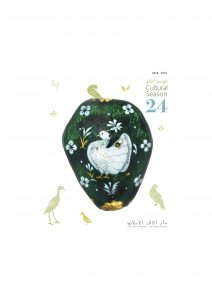 During the Mamluk period, Cairo was renowned for its book markets and the richness of its public and private libraries. Over the last century, there has been renewed interest in the history of the book, collecting and libraries. Published studies focused on data provided by primary sources, but largely overlook information supplied by the books themselves. Paratextual marks, the focus of this lecture, are now the subject of greater scrutiny, as they constitute original pieces of valuable information on the history of the books. More than ever, these marks also give us the opportunity to analyze the itineraries of these objects
During the Mamluk period, Cairo was renowned for its book markets and the richness of its public and private libraries. Over the last century, there has been renewed interest in the history of the book, collecting and libraries. Published studies focused on data provided by primary sources, but largely overlook information supplied by the books themselves. Paratextual marks, the focus of this lecture, are now the subject of greater scrutiny, as they constitute original pieces of valuable information on the history of the books. More than ever, these marks also give us the opportunity to analyze the itineraries of these objects -
jeu04Oct2018sam06Oct2018Sächsische Akademie der Wissenschaften zu Leipzig
15. Internationaler Kongress zur Diplomatik: Quellen zur Geschichte der „internationalen“ Beziehungen zwischen politischen Zentren in Europa und der Mittelmeerwelt (ca. 800–1600): Briefe – Urkunden – Verträge. Internationale Tagung der Commission internationale de diplomatique in Kooperation mit der Sächsischen Akademie der Wissenschaften zu Leipzig
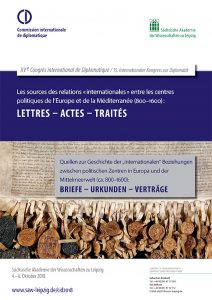 In the frame of the 15th International Congress on Diplomatics, Frédéric Bauden (Liège) and Marta Manso Rubio (Universitat de Barcelona - Institució Milà i Fontanals (CSIC)) will read a paper entitled "L’alliance conclue entre le sultan mamelouk Khalīl et le roi d’Aragon Jacques II en 692/1293" on 6 October 2018.
In the frame of the 15th International Congress on Diplomatics, Frédéric Bauden (Liège) and Marta Manso Rubio (Universitat de Barcelona - Institució Milà i Fontanals (CSIC)) will read a paper entitled "L’alliance conclue entre le sultan mamelouk Khalīl et le roi d’Aragon Jacques II en 692/1293" on 6 October 2018. -
jeu24Mai20189h-18h30Sala Archivio, Università Ca' Foscari, Venise
Launching RASCIO - Workshop, organized by Élise Franssen
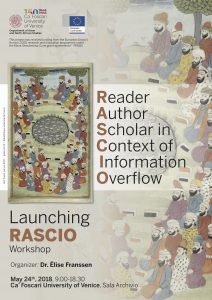 This workshop is the opening event of Élise Franssen's Marie Skłodowska-Curie project "RASCIO" (Reader, Author, Scholar in a Context of Information Overflow. How to manage and master knowledge when there is too much to know?" — grant agreement n° 749180; see here).
This workshop is the opening event of Élise Franssen's Marie Skłodowska-Curie project "RASCIO" (Reader, Author, Scholar in a Context of Information Overflow. How to manage and master knowledge when there is too much to know?" — grant agreement n° 749180; see here).It is intended to be a methodological and case-studies’ round-table. The different topics to be addressed are:
- Methodology and note-taking strategies
- Correspondence between scholars/littérateurs and networking
- Scholars’ libraries
- Digital humanities and on-line editions
For the full programme, see: Workshop RASCIO - program.
-
jeu25Juin2015dim28Juin2015Université de Liège
Second International Conference of the School of Mamlūk Studies
The conference will be divided into two parts:
1) The first day of the conference (June 25) will be themed. The theme of this part of the conference will be: "The Mamlūk Sultanate and Its Periphery". If our knowledge of the capital (and the provincial capital of Damascus) is rather comprehensive, the periphery of the sultanate has received less attention. The aim of this themed day is thus to focus on those areas located far from the capitals and close to borders (either natural, like the sea or mountains, or political). This will allow specialists in a wide gamut of fields, from history to architecture, from economy to administration, from diplomacy to politics, to address various issues linked with, e.g., the concept of periphery, the control of the borders, the intellectual, economic, and artistic life in border cities, etc.
2) The following three days of the conference (June 26–28) will be structured in panels, which may focus on any aspect of the intellectual, political, social, economic, and artistic life of the Mamlūk period.
Language :
The official language of the conference will be English.Fees :
The conference registration fees will be 40 € for participants and attendees. A farewell dinner will take place on June 27 at a cost of 50 €. Payment of the fees (registration and farewell dinner) must be received by April 30. -
lun27Avr2015mar28Avr2015Université de Liège
Culture matérielle et contacts diplomatiques entre l’Occident latin, Byzance et l’Orient islamique (XIe-XVIe siècle)
-
lun16Fév2015mer18Fév2015
-
jeu10Oct2013ven11Oct2013
-
lun06Fév2012mer08Fév2012
-
jeu13Jan2011sam15Jan2011
-
jeu15Sep2005sam17Sep2005


